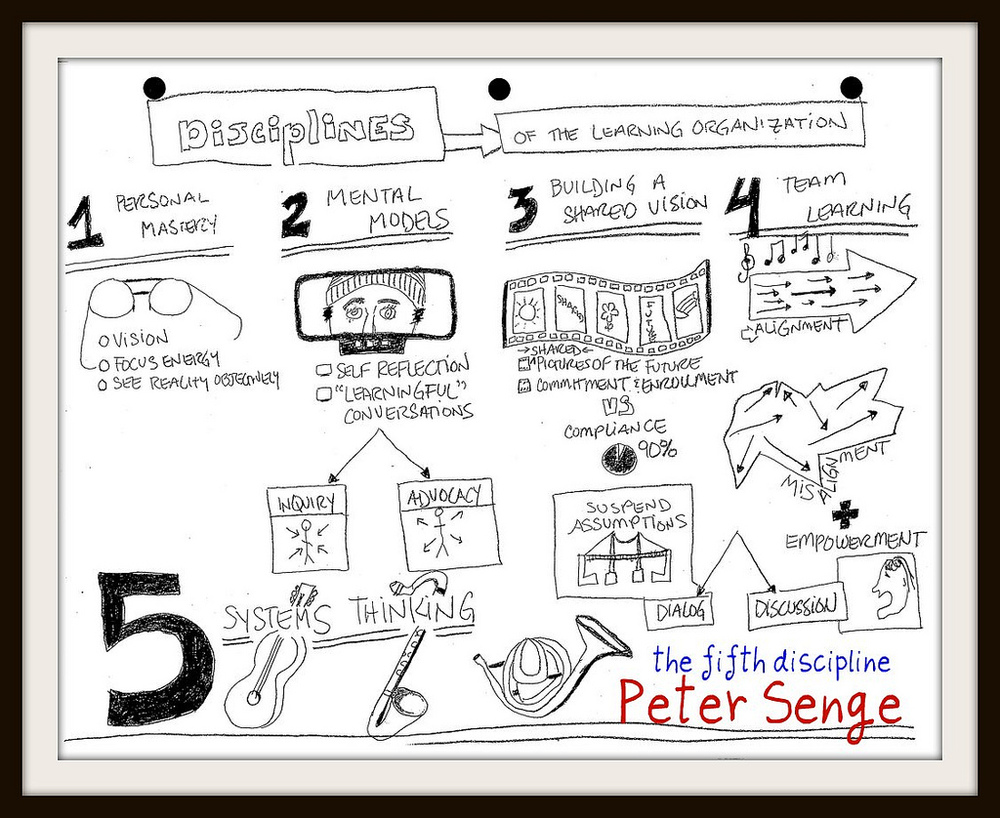Rizal Philippines
January 22, 2017

This post, entrepreneur, business executive has long implemented learning as one of its values (beliefs) in the organization that he has founded for more than 30 years. He has believed that its all about getting better.
Thus he was not surprised when Peter Senge came out with the book From Slideshare - Fifth Discipline PPt What is the fifth discipline? Shared learning. It is a process by which an organization encourages its members to learn, so that the organization continuously transforms itself. Learning is defined as the steps by which an organization acquires new skills and knowledge to innovate and compete and catch with the times. Stability and administration of a on going business is yielding to change and innovation. What is new gets old, the present becomes the past
The Fifth Discipline by Peter Senge
What have done so far to encourage our people in the organization:
1. Performance evaluation to require staff to : submit 1 book report a month, 3 blog comments a month on its community blog (so that the staff know what is going on); to require everyone to have a have a learning log (and to have at least 60 entries a quarter)
2. To require all staff to undergo orientation and pass the exams . No additional allowance shall be given unless this is fulfilled.
3. To promote staff via merit for following: with following steps
1. 40 book reports 1 step
2. MBA 2 steps
3. PRC license 1 step
4. Creating a manual, a software program - 1 step
We can learn a lot. WE cant be crazy. by learning Right now we are using only 7% of our brain power. When we were growing up that was at 30%. We can memorize the Bible or encyclopedia if we dedicate our passion and efforts to do so. Our brain has 1 trillion neurons that can store bits of information and that can be interconnected in an infinite number of ways more than quadrillion possibilities. That is why humans have invented so many things to improve upgrade our standard of living.
Somebody said can we learn while working. Kaya nga sinabi, the secret of success is hard work. We cant improve in our work we cant improve ourselves if we do not additional inputs from the world: internet, books seminars.
There was story about two brothers who were being chased by a flash flood. One said run, the other said run. The elder said: Ok let us pray while we run. We can learn while we work.
Those who lead read
This brings us back to the story about an exec, a senior exec at a major drug company who asked his subordinates as to what is the primary responsibility of a subordinate? Some say it is meeting the required targets and outputs; some say its about following the rules and regulations of the company; some say its about being loyal to the boss.
To which he said they are all ok but not quite.
THE PRIMARY RESPONSIBILITY OF AN EMPLOYEE IS TO IMPROVE HIMSELF. How can he do that? By learning new skills and knowledge to develop himself and his skills in his job so that he will grow.
We can only improve our production and output if we improve ourselves and learn new things. If we keep on doing old things expecting different results, it is INSANITY (Albert Einstein)